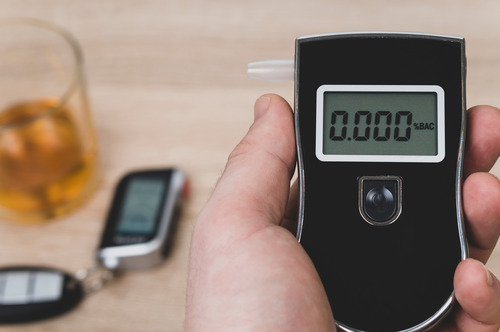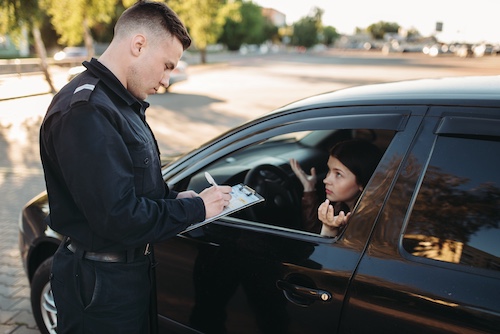Have you ever been pulled over for suspected drunk driving in Asheville? If so, chances are that the officer asked you to take a breathalyzer test. While this device is commonly used to determine blood alcohol content (BAC), it’s not always accurate. In fact, your lawyer may be able to challenge a Breathalyzer test and get your charges dismissed!
Keep reading to learn more about how a skilled Asheville DUI lawyer can help you fight back against a false positive breathalyzer test.
Quick Explanation: How a Breathalyzer Test Works
A breathalyzer test is a device used to measure the amount of alcohol in your breath. When you breathe into the machine, it measures how much alcohol is present and converts that information into an estimate of your BAC.
The device works by analyzing a sample of deep lung air for ethanol molecules. It can detect even trace amounts of alcohol, which makes it incredibly sensitive.
However, there are several factors that can affect the accuracy of a breathalyzer test. For example, if you have recently consumed mouthwash or other products containing alcohol, these substances could cause a false positive reading.
It’s also worth noting that some medical conditions may interfere with accurate readings. Conditions such as acid reflux or diabetes can alter the chemical composition of your breath and lead to inaccurate results.
While breathalyzer tests are widely used in drunk driving cases, they’re not always reliable. If you’ve been charged with DUI based on the results of a breathalyzer test in Asheville, it’s important to consult with an experienced attorney who knows how to challenge these types of tests effectively.
Your Lawyer May Assert that There Was No Probable Cause for Being Pulled Over
One potential defense strategy that your Asheville DUI lawyer may use to challenge a breathalyzer test is asserting that there was no probable cause for being pulled over in the first place. The Fourth Amendment of the U.S Constitution protects citizens from unreasonable searches and seizures by law enforcement officers.
If an officer pulls you over without probable cause, any evidence gathered after the stop may be deemed inadmissible in court. This could include results from a breathalyzer test. Your lawyer will want to investigate whether or not the officer had sufficient reason for pulling you over.
Some examples of valid reasons for a traffic stop might include speeding, running through a red light, or swerving on the road.
However, if an officer pulled you over simply because they suspected you were driving under the influence without any concrete evidence or observation of erratic driving behavior, this could be grounds for challenging both the traffic stop itself and any subsequent breathalyzer tests administered.
Having an experienced Asheville DUI lawyer on your side can make all the difference when it comes to building a strong defense against DUI charges based on questionable traffic stops and unreliable breathalyzer tests.
The Breathalyzer Device Could Be Poorly Calibrated
One way your lawyer may challenge a breathalyzer test in Asheville is by asserting that the device used was poorly calibrated. Breathalyzers require regular calibration to ensure their accuracy and reliability. If the device wasn’t properly calibrated, it could have given an incorrect reading.
Breathalyzer devices must meet strict standards set forth by the National Highway Traffic Safety Administration (NHTSA). These standards dictate how frequently they should be calibrated and what steps should be taken to maintain accurate readings. If these guidelines aren’t followed, then there’s a chance that the results of your breathalyzer test could be compromised.
Your DUI lawyer will look into whether or not the officer who administered your sobriety test maintained his equipment correctly. They’ll also investigate if there were any issues with the maintenance records of the device itself. A mistake at any point in this process could result in inaccurate readings and give rise to a defense against conviction for driving under influence (DUI) charges.
If it can be proven that an improperly calibrated breathalyzer led to your arrest on DUI charges, then you may have grounds for dismissal of those charges entirely – but only an experienced Asheville DUI Lawyer can help you navigate these complex scenarios effectively.
The Officer May Not Have Followed the Testing Protocol
When it comes to administering a breathalyzer test, law enforcement officers are required to follow a specific testing protocol. This includes ensuring that the device is properly calibrated and providing clear instructions to the driver on how to blow into the machine.
However, there are instances where an officer may not have followed this protocol. For example, they may fail to observe you for 20 minutes before administering the test or fail to change out mouthpieces between tests.
If your lawyer can prove that proper testing procedures were not followed by law enforcement, then you may be able to challenge the results of your breathalyzer test in court. This could potentially lead to your charges being dismissed or reduced.
It’s important to note that challenging a breathalyzer test based on an officer’s failure to follow testing protocol can be difficult. It requires extensive knowledge of DUI laws and experience handling these types of cases.
That’s why it’s crucial for anyone facing DUI charges in Asheville who believe their breathalyzer results may have been unfairly obtained due to improper testing protocol should seek out an experienced DUI lawyer who knows how to build strong defense strategies against such allegations.
A Medical Condition May Give a False Positive Result
People who suffer from acid reflux or gastroesophageal reflux disease (GERD) may have alcohol in their mouth due to regurgitation of stomach contents. This can lead to an inaccurate reading on the breathalyzer test.
Additionally, individuals with diabetes may experience high levels of acetone in their breath. Acetone is one of the substances detected by a breathalyzer and can result in a false positive reading.
Other medical conditions such as chronic obstructive pulmonary disease (COPD) and asthma can also affect the accuracy of breathalyzer results. These conditions can cause abnormalities in lung function which may impact how much air is exhaled during the test.
If you believe that a medical condition contributed to your failed breathalyzer test, it’s important to discuss this with your Asheville DUI lawyer as soon as possible. We will be able to evaluate your case and determine we can the results based on the specific circumstances surrounding your arrest.
Let an Experienced Asheville DUI Lawyer Get Your Charges Dismissed!
Challenging a breathalyzer test can be complex, but it’s not impossible. With the right legal representation and evidence, you may succeed in getting your charges dismissed or reduced. If you’re facing DUI charges, don’t hesitate to contact an experienced Asheville DUI lawyer who knows how to challenge breathalyzer tests.
At Asheville DUI Guy, we understand the intricacies of challenging breathalyzer tests. We will work tirelessly to investigate the circumstances surrounding your arrest and build a compelling defense strategy that suits your unique situation.
We believe everyone deserves fair treatment under the law and will do everything possible to protect your rights. Don’t let one mistake ruin your life forever. Contact us today at 828-702-8743 for a free consultation!





